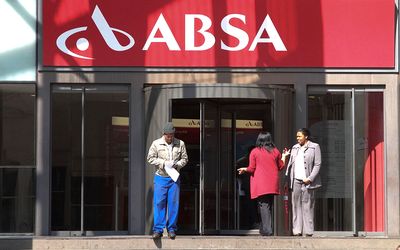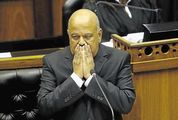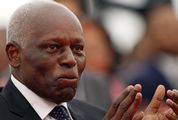Being ditched by UK bank may be just what Absa needs
by Chiziwiso Pswarayi,
2016-03-11 05:50:08.0
THERE is no doubt that in the first months of 2016 the economy has taken a few economic hits. Apart from the drought in the agricultural sector and the incessant political haggling, the news of Barclays Bank looking to sell down its interest in Absa has been the most recent economic blow.
Absa recently faced a ratings downgrade from Fitch. The downgrade resulted in foreign currency and local currency long-term issuer default ratios dropping to BBB-, from BBB and BBB+ respectively. In a time of economic uncertainty this is a blow. However, it only brings it down to the ratings of other South African banks.
Clearly, there was a correlation between Barclay’s official confirmation that it will sell its stake in Absa and its downgrade. This correlation, however, hides the fact that Absa’s worth did not stem being associated with Barclays, and that Absa is an entity in itself. The bank is fundamentally well funded and managed.
Barclays’ purchase of Absa in 2005 brought with it the hope of international-style banking on the African continent. The integration of the styles of banking, however, have not necessarily borne much fruit for Barclays in light of the rand’s devaluation and slower than expected growth.
Absa remains buoyant, however, while Barclays in the UK has faced numerous troubles. The Libor (London interbank offered rate) scandal shook the reputation of the British financial system, if not the world, to its core.
Libor is the rate at which banks lend to one another short term. This rate had been fixed by six large international banks, Barclays among them. Its plan to refocus on its core markets is undoubtedly related to its reputation being tarnished and a need to be more conservative in its banking operations.
During the time of the Libor scandal, Barclays was under the control of Bob Diamond, who was CEO at the time. The scandal resulted in the UK and US authorities fining the offending banks, and Diamond left under a cloud, later bringing scandal to Africa under another guise, that of Atlas Mara group, an African banking venture.
As Barclays seeks potential buyers for its African business, Diamond is said to be in the wings hoping for a possible takeover, which would be embarrassing to the bank that fired him a few years ago. From a reputational point of view, for Absa to be bought by another investment banking minded institution and individual would be something of a nightmare.
Although Absa has been downgraded, in the short term it may hurt and will suffer from negative reputational exposure. In the long term, the bank can finally operate and strategise within its own comfort zone, limiting the unnecessary linkages to a highly visible Barclays.
If whoever decides to buy into Absa allows it to continue its long-term growth strategy as a Big Five South African bank, this downgrade could be just a bump on a long road of positive growth.
• Pswarayi is a researcher and political-economic analyst

Picture: BLOOMBERG/NADINE HUTTON
THERE is no doubt that in the first months of 2016 the economy has taken a few economic hits. Apart from the drought in the agricultural sector and the incessant political haggling, the news of Barclays Bank looking to sell down its interest in Absa has been the most recent economic blow.
Absa recently faced a ratings downgrade from Fitch. The downgrade resulted in foreign currency and local currency long-term issuer default ratios dropping to BBB-, from BBB and BBB+ respectively. In a time of economic uncertainty this is a blow. However, it only brings it down to the ratings of other South African banks.
Clearly, there was a correlation between Barclay’s official confirmation that it will sell its stake in Absa and its downgrade. This correlation, however, hides the fact that Absa’s worth did not stem being associated with Barclays, and that Absa is an entity in itself. The bank is fundamentally well funded and managed.
Barclays’ purchase of Absa in 2005 brought with it the hope of international-style banking on the African continent. The integration of the styles of banking, however, have not necessarily borne much fruit for Barclays in light of the rand’s devaluation and slower than expected growth.
Absa remains buoyant, however, while Barclays in the UK has faced numerous troubles. The Libor (London interbank offered rate) scandal shook the reputation of the British financial system, if not the world, to its core.
Libor is the rate at which banks lend to one another short term. This rate had been fixed by six large international banks, Barclays among them. Its plan to refocus on its core markets is undoubtedly related to its reputation being tarnished and a need to be more conservative in its banking operations.
During the time of the Libor scandal, Barclays was under the control of Bob Diamond, who was CEO at the time. The scandal resulted in the UK and US authorities fining the offending banks, and Diamond left under a cloud, later bringing scandal to Africa under another guise, that of Atlas Mara group, an African banking venture.
As Barclays seeks potential buyers for its African business, Diamond is said to be in the wings hoping for a possible takeover, which would be embarrassing to the bank that fired him a few years ago. From a reputational point of view, for Absa to be bought by another investment banking minded institution and individual would be something of a nightmare.
Although Absa has been downgraded, in the short term it may hurt and will suffer from negative reputational exposure. In the long term, the bank can finally operate and strategise within its own comfort zone, limiting the unnecessary linkages to a highly visible Barclays.
If whoever decides to buy into Absa allows it to continue its long-term growth strategy as a Big Five South African bank, this downgrade could be just a bump on a long road of positive growth.
• Pswarayi is a researcher and political-economic analyst
























Change: 0.40%
Change: 0.47%
Change: -0.49%
Change: 0.53%
Change: 1.03%
Data supplied by Profile Data
Change: 1.71%
Change: 1.28%
Change: 0.40%
Change: 0.00%
Change: 1.64%
Data supplied by Profile Data
Change: 0.09%
Change: 0.13%
Change: 0.33%
Change: 0.23%
Change: 0.12%
Data supplied by Profile Data
Change: 0.10%
Change: -0.10%
Change: 0.19%
Change: 0.00%
Change: -0.17%
Data supplied by Profile Data